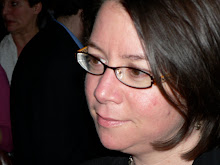The wise child asks, 'What are the precepts, laws, and observances which God has commanded us?' In response we should explain the observances of Passover thoroughly.
The wicked child says, 'What is this observance to you?' Since he says 'to you' and not 'to us,' he rejects the unity of Israel. Thus we respond sharply: 'It is because of what God did for me when I went forth from Egypt -- for me, and not for you... for had you been there, you would not have known redemption.'
The simple child asks, 'What is this?' To the person of open simplicity, give a straightforward answer: 'With a mighty arm God freed us from Egypt, from the house of bondage.'
With the person unable to ask, you must begin yourself, as it is written: 'Tell your child on that day, saying, This is because of what God did for me when I went free from Egypt.'
What kind of parent does this text invite us to be? Approving, rejecting, informing, initiating. It's not much of a palette in my book. And the level of rejection, in particular, seems just inexcusable.
At the kids' seder at Aaron's school last night, our rabbi spoke about this passage. He admitted it is a difficult text. He offered a different translation of the Hebrew word that is translated as "wicked": he said he prefers "insolent," a characteristic of many children and probably all teenagers, at one time or another. He said in his way of thinking, there is a little of each of the four children in each of us, and that the important thing is that they are all at the table. Even the surly one.
His statement got us curious about the word "wicked," and Dale's somewhat chilling guess was correct: "wicked" is from "wicca," same root as witch and wizard. So it's pretty rude of us to use it as a synonym for "very bad." The Hebrew word often translated as "wicked" is rasha, which apparently means "to depart from the path and become lost." It's the opposite of tzaddik, which is translated as "righteous," but has a more concrete meaning of "one who stays on life's path."
Well, now, that is more palatable. We can all go off the path. And we can imagine parenting a child who is somewhat off the path. So, at tonight's mini-Seder, Dale and I shared what we had learned with the kids, and I felt more able to discuss the Four Children without rancor.
Well, now, that is more palatable. We can all go off the path. And we can imagine parenting a child who is somewhat off the path. So, at tonight's mini-Seder, Dale and I shared what we had learned with the kids, and I felt more able to discuss the Four Children without rancor.
R: What if there was someone who visited our Seder who had gone off the path and maybe had very bad manners? What do you think that person would say to us?
J: He might say, "Can we just eat?"
A: He would say, "This food is stupid."
R: How about someone who never heard of any of this Passover stuff, just never saw it before?
J: "What are all these different things here? What do they mean?"
J: "What are all these different things here? What do they mean?"
A: "And everything looks very yummy."
R: What if there was someone very smart with nice manners who already knew a lot about Passover, like maybe one of the teacher's aides at religious school? What would they say?
J: "When can we start? I want to do everything."
Jordan is Seder-savvy and knows the right answers, but I still appreciated both of their contributions. I forgot to discuss what we should say back to these personae. Then I found this fine little video, which someone should have shown me thirty years ago.
Jordan is Seder-savvy and knows the right answers, but I still appreciated both of their contributions. I forgot to discuss what we should say back to these personae. Then I found this fine little video, which someone should have shown me thirty years ago.

No comments:
Post a Comment